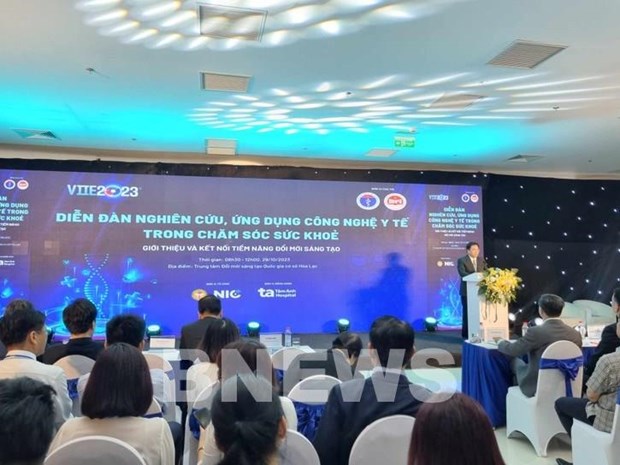
|
Getting your Trinity Audio player ready...
|
According to Deputy Minister Tran Duy Dong of the Ministry of Planning and Investment, healthcare stands as a key sector in the government’s national digital transformation programme. For the sector, the strategy outlined four fundamental pillars: disease prevention and healthcare, medical examinations and treatments, healthcare administration, and the facilitation of online international specialised conferences.

Minister Dong has said that the COVID-19 pandemic has spurred a significant advancement in digital transformation within the healthcare sector. Rapid deployment of technological applications has enabled nationwide access, including health declaration apps like NCOVI and PC COVID, the contact tracing app Bluezone, and telemedicine services.
The pandemic has partly highlighted the significance of innovation in the healthcare sector for the well-being of the public and the process of socio-economic recovery and development.
He was speaking at a recent forum, which took place at the National Innovation Centre (NIC) in Hanoi to discuss the integration of medical technology into healthcare practices. Held as a component of the NIC’s inauguration and the Vietnam International Innovation Expo 2023 scheduled from 28 October to 1 November, it aims to offer a comprehensive overview of crucial aspects in the healthcare sector.
It also serves as a platform to introduce and connect potential partners in medical technology and digital transformation, including hospitals, centres, research institutions, and medical universities locally and internationally. It connects domestic organisations and units with international technology developers and investors to boost the development of the healthcare sector.
Deputy Minister of Health Tran Van Thuan emphasised that innovation in the healthcare sector involves the generation and implementation of new technological concepts, processes, and solutions aimed at enhancing the quality of services and products and driving scientific progress in the field of medicine.
The government will foster innovation, which is poised to address the challenges and the increasing healthcare needs across all stages, from primary healthcare and disease prevention to diagnostics and treatment, as well as the development of pharmaceuticals, vaccines, biologicals, and medical equipment. Innovating in healthcare demands collaboration between medical professionals, technologists, policymakers, and investors to make positive changes during the ongoing Fourth Industrial Revolution, he said.
As part of its efforts to digitally transform the healthcare sector, the Ministry of Health initiated a project for remote medical examinations and treatments last year with the goal of enhancing the professional capacities of healthcare facilities at the grassroots level. It also helped in the dissemination of expertise and medical knowledge from central-level hospitals to both the public and healthcare workers nationwide.
As reported by OpenGov Asia, the growth of remote medical procedures has benefited both patients and healthcare professionals, particularly those in remote regions, by granting them access to advanced medical techniques.
Technology has streamlined communication between medical facilities nationwide, enabling the direct exchange of a vast amount of information at any moment. For instance, echocardiography, a complex medical technique, can now be monitored by doctors in Hanoi for patients residing in remote and mountainous areas, thanks to technology and telemedicine programmes.
Doctors at central-level hospitals can collaborate with their counterparts in various provinces and cities to consult on and treat critical cases. This eliminates the need for patients at smaller healthcare facilities to be transferred to other hospitals. Additionally, people can schedule medical examinations and treatment appointments at numerous hospitals via phone or internet applications, avoiding the need to wait in queues for registration.
The country’s goal is to modernise the healthcare sector in line with international standards. The government wants all public healthcare facilities to set up telemedicine sections and build and gradually form a healthcare and disease prevention system based on digital technologies. They should also integrate digital technology in medical facilities to aid in administrative reform, alleviate the burden on hospitals, and enhance the quality of medical examinations and treatments.
















